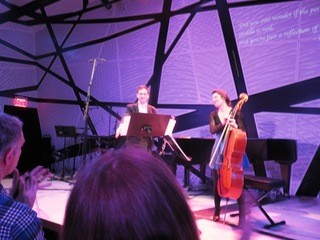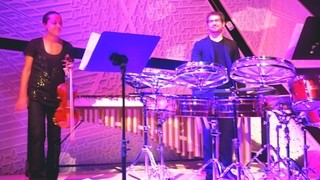|
Back
Happy New Ears! New York
National Sawdust, Williamsburg, Brooklyn
03/29/2016 -
“Reflections”
Andrea Casarrubios: Speechless (World Premiere)
Jay Wadley: Varying Density
Svante Henryson:Off Pist
Missy Mazzoli: Still Life With Avalanche
John Cage: 4’33”
Claude Baker: ”R.S.” from Three Phantasy Pieces (New York Premiere)
Dobrinka Tabakova: Insight
Carnegie Hall’s Ensemble ACJW: Beomjae Kim (Flute, Harmonica), Stanislav Chernyshev (Clarinet), Jean Laurenz (Trumpet), Garrett Arney (Percussion), Shir Semmel, Michael James Smith (Piano), Elizabeth Fayette, Siwoo Kim, Kobi Malkin (Violins), Dana Kelley, Danny Kim (Viola), Andrea Casarrubios, Michael Katz, Caleb van der Swaagh (Cello), Jay Wadley (Electronics)

S. Chernyshev, A. Casarrubios (© Samuel A. Dog)
ACJW, should have been ashamed of itself last night. No composers to give scholarly exegeses of their creations! No copious program notes! Amorphous titles like Insight, or Varying Density, giving no hint of how we should appreciate their stuff.
In brief, the musicians came on stage in twos or fours, and merely played the music. Even worse–oh, the audacity–they expected the audience (most of whom had paid money to enter) to apply our ears!! (May the Muses forgive them). And employ our minds and our ownsenses! (May Saint Cecilia curse them from her Heavenly Conservatory.)
True enough, the sparse program did suggest that “Reflections” provided “a space where the audience and performers can explore their own voices...encouraging a formation of their own connections.” That, though, meant that we were asked to do our own perceiving and use our own synapses instead of letting the musicians do all the digital exertions.
Ah, where are the shows of yesteryear?
On the positive side, ACJW comprises our finest young musicians on a two-year fellowship to prepare them for even greater ventures. So the Augean aural tasks we were given can be pardoned. Especially since these six composers of the last decade have made quantum leaps away from Second Viennese School strictures, and unashamedly seize whatever notes in whatever patterns occur to them.
With the caveat, of course, that they seem to have mastered every technique available.
And the other positive side is that, with our attention attuned, much of the music, all from composers with some international repute, was so good-natured, produced not only by ACJW artists but the composers themselves.
I’m not referring to John Cage’s 4’33” played by a well-meaning string quartet. Cage’s canard, like the repetition of a once-clever pun, has lost its savor over the past 64 years, as well as the woodland sounds which accompanied its premiere in a Woodstock barn.
But one had to laugh–or even give a “Hee-haw!”– for Off Pist, the unashamed American hoedown written by Norwegian eclectic composer Svante Henryson. The unlikely instruments were clarinet and cello, and the zest was enough for the stolid audience to perhaps wish to twirl their partners. Clarinetist Stanislav Chernyshev and cellist Andrea Casarrubios were hearty enough, and Ms. Casarrubios had every right for happiness, since her own composition, Speechless, opened the program equally jauntily.
The jauntiness wasn’t from her cello (which served as an enhanced basso continuo), it came from percussionist Garrett Arney. Mr. Arney was the centerpiece in four of the evening’s works, with a variety of instruments ranging from bass drum to harmonica. In Speechless, the beginning was gorgeous. The sounds of the bows against various-sized marimbas against the high cello sounds of the composer were pure atmosphere, far more memorable than the syncopated second part.

D. Kelley, G. Arney (© Samuel A. Dog)
By far, I felt, the most delightful bricolage came in the enigmatically-named R.S. from Three Phantasy Pieces, by Claude Baker. After a few seconds, it was obvious that the initials stood for Robert Schumann, for Ms. Kelley was playing the second Märchenbild The trumpet calls intact, though Mr. Baker had given us some tapping, rolling drum sounds rather than a piano. It was all in good semi-parodistic fun–even the sudden entrance of Berlioz, as Messrs Kelley and Baker brought us to the Symphonie fantastique guillotine.
The most complex work, Missy Mazzoli’s Still Life With Avalanche lacked the vital power I had heard when played by its dedicatees, “eight blackbirds.” It was certainly attractive, the many melodies seemingly piling onto each other, with different colors. As an old blues harmonica man, I enjoyed Beomjae Kim’s solos on a non-chromatic mouth organ (though his flute playing was a bit more challenging) and even with these changes of tempo and mood, the last two measures, in a major key, were still affecting.
Two works reflected music of other eras. Perhaps it was unconscious, but Jay Wadley’s Varying Density, with its muted trumpet, viola and soft percussion was a 21st Century reflection of Aaron Copland’s Quiet City. The composer added his own electronic buzzing for the modern element, yet this still was very much a New York nocturne.
My favorite of all the music was Dobrinka Tabakova’s Insight. Yet this too was an eclectic remembrance of musics past. The Bulgarian composer started with an undeniable Indian raga introduction, played, perhaps improvised by Caleb van der Swaagh’s cello glissandos. With a seamless continuity, Ms. Tabakova worked the three strings into music which–like an original recipe made with three familiar ingredients–was tasty and teasing. The modal sounds were both 14th Century and Arvo Pärt, yet the melodies savored those of Samuel Barber in one of his more mystical moods.
This music turned back to the Indian sounds again, as if Ms. Tabakova wanted to close the cycle with sounds which echoed eternity rather than its genesis in 2002.
It was performed by Mr. Van der Swaagh, Ms. Kelley and violinist Siwoo Kim not only with the prodigious ACJW technique but a well-deserved quiet passion.
Harry Rolnick
|